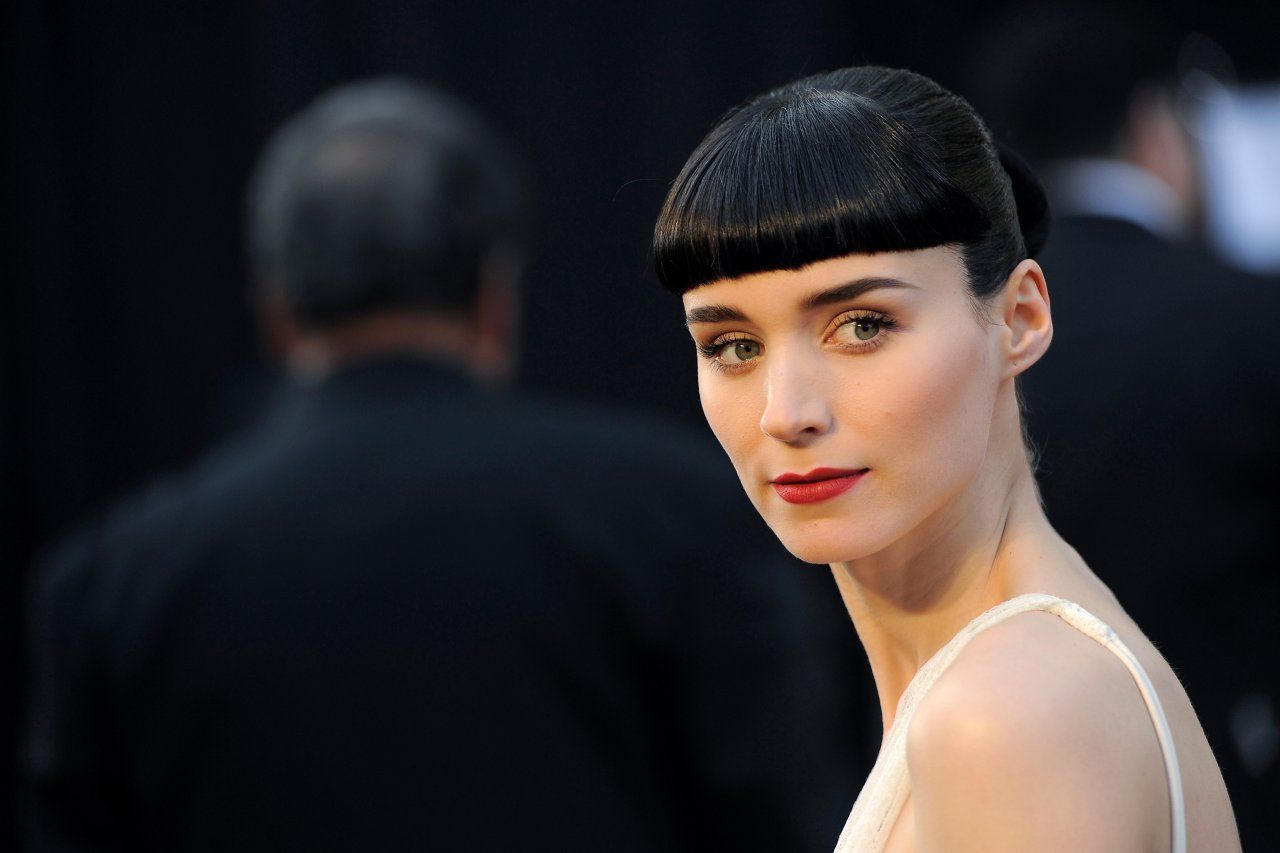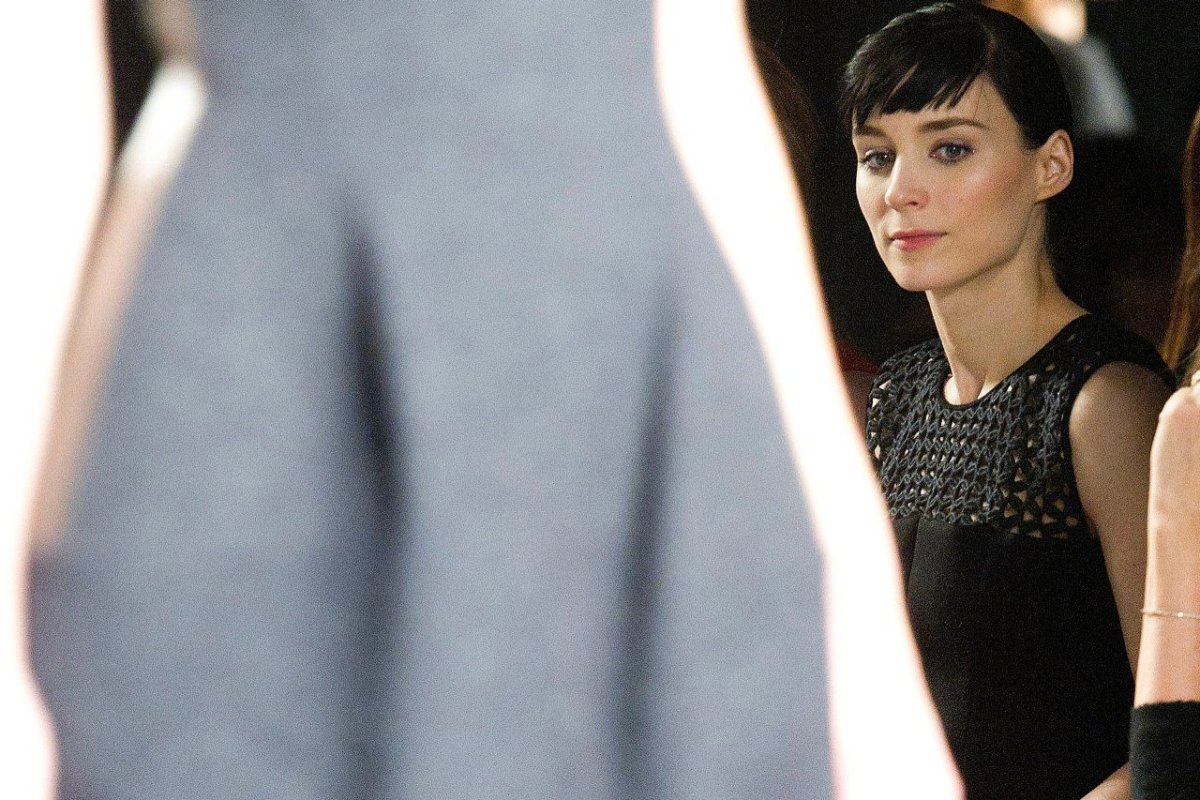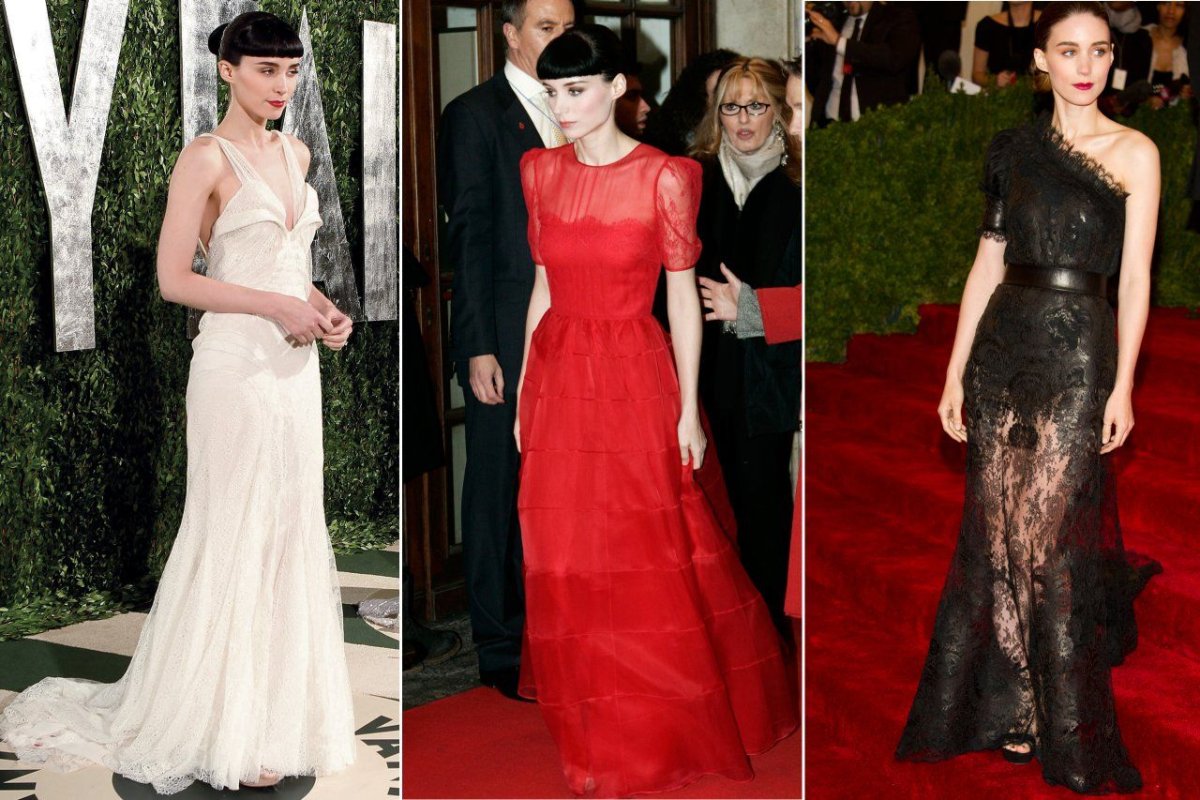
I'm interested in the duality of people," says Rooney Mara, of her predilection for caliginous characters. "I have a lot of darkness and frenetic energy inside myself, so it's easier for me to portray people with shades of gray."
After two and a half months of grueling auditions, which included simulating the film's lurid rape sequence, Mara beat out the likes of Scarlett Johansson and Jennifer Lawrence for the role of Lisbeth Salander—an icy bisexual hacker in The Girl With the Dragon Tattoo. A Best Actress Oscar nomination soon followed, catapulting her to the rarefied air of Hollywood's most wanted.
"We asked her to do some pretty horrendous s--t, and I never felt her shy away from anything," says her Dragon Tattoo director David Fincher. "If there's one thing Lisbeth had to have, it's what Rooney has in spades: she's singular."
The singular 27-year-old actress has four disparate film projects scheduled to hit theaters this year, including a Terrence Malick love story opposite Ryan Gosling, the gritty '70s-era Western Ain't Them Bodies Saints, Spike Jonze's sci-fi flick Her alongside Joaquin Phoenix, and Side Effects, a pharma-thriller helmed by Steven Soderbergh.
Side Effects, in theaters Feb. 8, is the opening salvo. Mara assumes the role of Emily Taylor, devoted wife to a financial hotshot busted for insider trading, played by Channing Tatum. When his four-year prison stint is up, he's released to her and harbors the delusion that they will soon rejoin the ranks of the 1 percent. Emily then spirals into a deep depression, apparently triggered by a prescription from her shady doctor (Jude Law) for a cutting-edge antidepressant, Ablixa. Mara's feral performance sends the viewer on a wildly unpredictable series of twists and turns, made credible by the actress's fierce dedication to the role.
"It's hard to really quantify Rooney," says Tatum. "She has such a fire in her and you don't think she does, because she's so unassuming. So when she snaps, you're just like, 'How the f--k did that come out of this little, ethereal being with the porcelain skin?' And when she laughs it's completely shocking, too. It's part of her mystique."
Adds Law, "There isn't a desperate bone in her body; she's very cool. And it's a rarity for someone of her age to be so fearless as a performer. She's capable of going to the dark places, which is bold."
In order to prepare for the character of Emily, Mara met with psychologists and those suffering from depression. According to screenwriter Scott Z. Burns, he sent Mara a series of YouTube video diaries of people diagnosed with depression and made her a mix of sad music (at her request). Mara became obsessed with the videos as well as the mix, her favorite songs being "Black Balloon" by the Kills and Paul Westerberg's "Bookmark."
Asked if she's ever dealt with depression herself, Mara takes a long pause. "Yeah, I was kind of a troubled teenager," she says. "I think everyone has an experience with depression, anxiety, or sadness because growing up is so traumatizing."
Soderbergh took a shine to Mara after his pal Fincher showed him an early cut of The Social Network. Mara plays Erica Albright, a brainy, girl-next-door type who trades verbal barbs with eventual Facebook founder Mark Zuckerberg, played by Jesse Eisenberg, in the film's riveting opening sequence.
"We had two mandates: she had to be somebody who could go toe-to-toe with Jesse, because he's so verbal and quicksilver, and she also had to be the one that got away, so she needed to be special, really bright, and pretty," says Fincher, before adding with a slight chuckle, "you can fake a lot of things in movies, but that's not one of them."

Several months later, Soderbergh was renting an office in Fincher's building while the latter was in the throes of searching for his Dragon Tattoo leading lady. He would pop into Fincher's office every so often to check on how things were going, when one day Fincher said, "I want Rooney to do it." Soderbergh backed Fincher's renegade decision—the studio wanted an established star—and in the process befriended Mara. When Fincher and Rooney returned from filming Dragon Tattoo, they had developed a very close bond. Soderbergh asked how the decision had panned out, and Fincher told him, "She's great. You just wind her up and turn her loose."
Soderbergh cast Mara in the role of Emily in February 2012, and filming began that April in New York City. The filmmaker was immediately taken not only by Mara's "striking features," which he tried to accentuate the best he could through inventive camera angles, but also how she seemed to possess a unique expressiveness, or as he puts it, "a lot going on behind the eyes."
"She didn't seem to have any interest in being my friend, which is totally fine," says Soderbergh. "I found her very private, or whatever the opposite of oversharing is."
Mara has, it seems, always been a very guarded person.
She grew up in Bedford, N.Y., a suburban town in Westchester County. Despite her noble NFL lineage—she is the great-granddaughter of New York Giants founder Tim Mara and Pittsburgh Steelers founder Art Rooney Sr.—Mara had a decidedly middle-class upbringing. Her father was vice president of player evaluation for the Giants, and her mother was a part-time real-estate agent. Her classmates, however, cast aspersions on her because of the whole football thing, which alienated the young Mara.
"I went to a lot of football games, but I didn't really understand what was 'special' about my family until I was much older," she says. "Kids would treat me differently and assume that my family had more than we did. I didn't like that. I had a really blessed childhood, but I went to a public school, we bought food at Costco, and I definitely wasn't buying my back-to-school clothes at Barneys."
The high-school version of Mara is quite similar to the current one, she says. She was incredibly shy and refused to participate in any sports or other group activities.
"The first day of high school, I went home halfway through because I was sick with anxiety," she says. "Actually, the whole first week of school I was terrified. As a teenager, I spent a lot of time alone. I sat alone during lunch. I was a very strange child."

Like her older sister, Kate, Mara enrolled in acting classes from a very early age. She always knew she wanted to be an actor, she says, and eventually decided to try out for the school play at the end of ninth grade—Romeo and Juliet. One of the judges at the audition was her English teacher, Mr. Shanley (with whom she's still pen pals to this day). She performed her monologue and darted out of the room. Mr. Shanley came sprinting after her down the hall and exclaimed, "I didn't know you could really talk! That was amazing!" Mara won the coveted role of Juliet.
"After we did the play, people kept coming up to me and saying, 'I didn't know you really spoke,' " she says. "I'm very shy but when I get comfortable with people I'm not, and I have a little spark to my personality ... a little punch. But I'm very slow to warm up to people."
She graduated high school early and visited Bolivia, Peru, and Ecuador as part of a four-month study-abroad program, which she says was "life-changing." Afterward, she enrolled in George Washington University but "hated" the frat-party scene there, so Mara transferred to New York University following her freshman year. "I loved NYU, but I don't know one person that went there; I didn't make one friend," says Mara. "I was living off-campus with friends from high school and was trying to get acting jobs."
When Mara began auditioning at 19, she noticed that most of the girls she was competing against had been acting since an early age. S--t, I think it's too late, she thought. Struggling to book gigs, Mara starred in two short films by fellow NYU students to beef up her acting reel, but says she never received the tapes. "The first one was called La Familia, and I played the daughter of a messed-up family and I had this scene where I screamed at my mom," she says with a rare laugh. "The other one was Betty Dove and I played the cool, mean girl."
After a few regrettable roles, including that of an affluent teen who gets her jollies terrorizing fat people on Law & Order: Special Victims Unit, and the tortured lead in the movie remake of A Nightmare on Elm Street, Mara hit pay dirt with the one-two punch of The Social Network and The Girl With the Dragon Tattoo.
For Dragon Tattoo, Mara completely embodied Salander—dying her hair jet black, fashioning it into a goth mullet, and covering her body in piercings. When filming wrapped, it became evident that remnants of Salander remained in Mara. Gone were the brown tresses and bubbly dresses in favor of dark bangs and a plethora of black haute-couture dresses that accentuate her incredibly fair skin.
"[Playing Salander] was hard to shake off," she says. "But my style has always changed and I've always had an eye for fashion. When I was little, I would wear the weirdest things and really believe in them. And I used to wear more feminine stuff, but I don't feel like myself in those things anymore. I feel too old to be wearing little baby-doll dresses."
Mara and her Dragon Tattoo costar, Daniel Craig, are signed on for two more films, but the franchise's future remains up in the air. She says she's "ready to go," while Fincher says he can't discuss the prospect of sequels, only confiding "we're trying to get there."
In the meantime, Mara wants to take some time off to travel, and wait patiently on the sidelines until the right role comes along. She's also worried that, with four films being released this year, she'll become overexposed. "I think it's actually too much," she says. "I like working all the time, but I don't think it's good to have yourself out there all the time. I don't want people to get sick of me."
Soderbergh, who says he is retiring "for the foreseeable future" from feature filmmaking after Side Effects, doesn't see that happening any time soon. "The thing that Robert Redford had that was compelling was that you never felt like you were getting all of him; he was always just out of reach," he says. "But boy, did you want to reach him. Rooney has that innate quality. It's called watchability."
Uncommon Knowledge
Newsweek is committed to challenging conventional wisdom and finding connections in the search for common ground.
Newsweek is committed to challenging conventional wisdom and finding connections in the search for common ground.
About the writer
To read how Newsweek uses AI as a newsroom tool, Click here.






